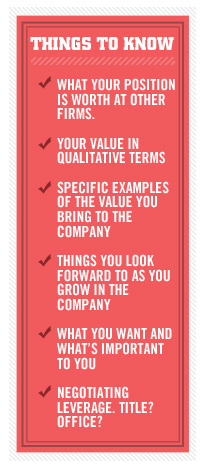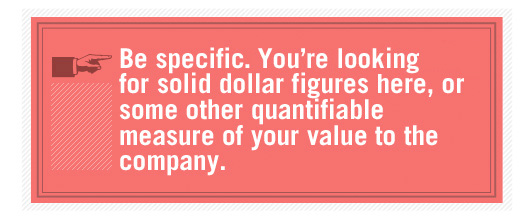You’ve been been working for the same company for one year, three years or even five years. And for some reason, you’re still getting the same salary as you did when you first started. If this sounds like you, then you’re leaving an obscene amount of money on the table. You deserve that money, and your employer is likely willing to give it to you. But there’s a good reason why they haven’t: you haven’t asked.
For those of us who work for companies that don’t have standard employee-review cycles, the only way to get more money is to ask. And asking for more money from your employer is perhaps the most awkward intra-office interaction you can have, aside from having to turn down a drunken proposition from the CEO’s mother-in-law at the holiday party. If it’s your first time, venturing a request for a raise can make you feel a bit like George Costanza gearing himself up to declare his love for his girlfriend.
Cause if you don’t get the raise, that’s a pretty big matzoh ball hanging out there.
As with all intimidating firsts, you can take the scariness out of negotiating your pay raise by having a clear-cut game plan with contingencies for every likely outcome. Luckily, there is a protocol for effectively asking for a pay raise—and for most model employees, it works. So, if you’ve got the jitters about the money talk, then relax. Take a deep breath, and do everything described below:
Before The Ask
Don’t go into that conference room and wing it. Treat this like a bona fide sales presentation. Line up some compelling points that sell yourself and have an outline for delivering them.
This should include:
Your Fair Market Value
If you were on the job market, getting headhunted or interviewing at other companies, what kinds of offers would you be receiving? You can glean this information passively, by browsing job boards and sites like PayScale.com or GlassDoor.com. But it’s better to speak directly with someone with their finger on the pulse. If you are a member of a professional association, guild or union, that’s an obvious place to start. Recruiters or hiring managers in an HR department at a similar firm are also great resources. Plus, you get the added perk of making initial contact with these folks. Who knows, maybe they’ll just happen to be looking for someone like you to fill a sweet position.
Hard Numbers that Demonstrate Your Value
Be specific here. You’re looking for solid dollar figures here, or some other quantifiable measure of your value to the company. For example, if you’ve saved the company $200,000, asking for a meager $3,000 extra per year seems highly reasonable. Also be sure to mention ways you were instrumental in bringing in big clients—it wouldn’t hurt to remind your manager of the size of their accounts, while you’re at it. If you're not involved in attracting business, reinforce your role in producing work that keeps those clients happy.
Episodes that Demonstrate Your Qualities and Dedication
In lieu of or in addition to hard number figures, it’s worthwhile to recount Herculean tales of glory where you went to bat for the company and hit it out of the park. This is handy, say, if your company just went through a rough patch (and whose didn’t in 2008-2009?). For one, you obviously survived any massive waves of layoffs. But you also pulled it together and helped the company persevere, even though you were short on resources, manpower and new clients.
Even if all you did was keep busy during the down times, that’s worth mentioning. For example, you could say, “Back in 2008, when the financial crisis basically turned off our supply of new work, I stayed focused and helped eliminate our backlog. I also took time to streamline and improve our project management system and address some outstanding quality issues so that when business did pick up again, we were able to make a strong return to form.”
Okay, got all that taken care of, typed up and rehearsed? Now, it’s time to schedule the meeting. This should be done formally—either by phone or email, whichever your supervisor prefers. Be assertive and clear cut about it. Don’t just bump into your boss at the water cooler and say, “Hey Kev-bone, I was wondering if you maybe had a chance we could talk about something I’ve been meaning to, you know…I mean let me know when you’re not busy.”
Instead, schedule it just like you would any other important meeting. And be upfront about what you’ll be talking about.
“Hi Kevin, Would you be available next Friday to sit down and talk with me about my value to the company?”
Actually, that may even be too vague. Don’t be afraid to come out and say “salary” or “compensation”—they aren’t dirty words.
During Your Discussion – Talking Points
Okay, it’s meeting time. You already have the meat of what you’re going to say fleshed out, but it’s important to keep the tone of the meeting conversational, rather than confrontational. Don’t storm into the conference room, slap your updated resume on the table and say, “$10,000 raise and a company car, or I am so out of here.” Ultimatums are about the worst thing you can deliver. The truth of the matter is, even if your company truly does need you, even if they would be incredibly screwed without you, this fact is not nearly as compelling as you think it is. It’s more likely that your boss will get annoyed or offended by this attitude and then work extra hard to convince him or herself that you aren’t essential.
You want the opposite. You want your boss—especially if he or she is a middle manager—on your side. You want them to be an advocate for your case. The discussion should be, “Yes, you are an asset to this company, and you do deserve to be rewarded. What kind of mutually beneficial arrangement can we work out?”
To get to that common ground, it’s best to stick to some key talking points. These include:
- Positive things about your past relationship with the company. Talk about how rewarding it has been to work with the company. Talk about the unique things you love about the company that you can’t get anywhere else.
- Positive things that you look forward to as your relationship with the company grows. Talk about how stoked you are about a specific project, development or goal. Prove that you’re invested and passionate about your future with the company.
- Your demonstrated value to the company. These are the hard numbers and achievements you prepared before the meeting.
- Key changes to your role since you were hired. Have you mastered any new skills? Taken on new duties, or absorbed the duties of someone who was downsized? Taken on more hours without being eligible for overtime? Taken on a new title? Be sure to mention that.
- What you want.
That last one is a biggie—be sure you have it nailed down before you walk into the conference room. Tell them what you want in concrete terms. Put it in terms of what you’re worth without accusing them of underpaying you. This should be easy, since you’ve already researched your fair market value.
Ask for the raise, and any other perks you think you deserve.
Now the ball’s in their court.
Wrap Up and Response

They say: “Yes, we appreciate the value you bring to the company and we will gladly give you everything you are asking for.”
You say: “Great, thank you very much! I am excited to continue performing excellent work for you and furthering the company’s mission.”
Graciousness is key here. Don’t lord it over anyone, just be polite and grateful and, of course, keep track of what needs to be done to finalize the pay raise. After a few days, follow up with your manager or HR to see when the raise will be made effective.
They say: “Yes, we appreciate the value you bring to the company, but we can’t give you what you are asking at this time. How about a compromise?”
You say: “I appreciate that. Can I think about it?”
Never accept the first offer, unless it’s exactly what you wanted. Give them time to stew it over, and stew it over yourself. You might want to come back with a discussion over non-salary perks, such as more paid vacation, reimbursement for commuting, etc.
One good idea: ask for a new title. Titles are usually meaningless within the company, but they look awesome on your resume. Most companies will be more than happy to change your title from “Analyst” to “Deputy Vice President of Research.”
They say: “This all sounds good, but I have to bounce it off some other managers.”
You say: “ Great, thanks very much for your time and support.”
Shake his or her hand and leave with a positive vibe. Then, follow-up by emailing them the minutes from the meeting (including your list of achievements and highlights from your fair market value research). Thank them again in the follow-up. But whatever you do, do not CC the other supervisors that your boss will be discussing your pay raise with. Let him or her run it up the ladder, otherwise it’ll seem like you’re trying to go over his or her head.
They say: “No, because [insert reason]…”
You say: “Okay, thank you very much for your time. Before we wrap things up, can you tell me what either I or the company would need to achieve in order for that answer to be different if we resumed this conversation six months from now?”
Getting rejected for a pay raise is your best opportunity for getting one the next time you ask. By getting your boss to lay out specifically what you would need to do in order to qualify for a pay raise, you can build an excellent case when you ask again six months from now. Then, make that your goal going forward. For example, if they say that they need to win 11 more clients before they can begin giving raises, devote your effort towards achieving that. Or, if they want to see you increasing your sales, shortening your turnaround times or improving your customer relations experiences, start keeping track of your performance now so you can show your improvement down the road.
Conclusion
Even if you don’t get the money you asked for, there are clear ways to measure the success or failure of your request for a pay raise. At the very best, you will get what you deserve. But even if a raise isn’t possible at this juncture, you should walk away with the tools you need to make it happen next time you ask. The key is to remain positive and approach the discussion as an ongoing conversation about how you can make your long term relationship with the company as mutually beneficial as possible.

















